-
Tuesday, 3 December 2019 – From 6:15pm to 9pm
Table 1. Counter-Narratives
Overture: For a Political Reading of Atget as a founding Figure of Modernity in Photography
This first round-table discussion puts forward an interpretation of photographer Eugène Atget based on the study of the ideological affiliations in his work, both implicit and explicit. This side is often overlooked in accounts of modernity in photography, which focus on Surrealism and the “new vision” as the overriding paradigms in the interpretation of the avant-garde in the 1920s, with Atget seen as its great precursor. Precisely as Molly Nesbit expounds in her seminal work on the photographer, part of the archival logic of his work is determined, ideologically, by his link to the worker movement. Thus, his album of Paris interiors offers a comparative analysis of society and class divisions at the turn of the century. Such a historical-social observation, referring to the breadth of Atget’s work from the start of the 1890s, anticipates the materialist focal points and photography projects that would not emerge until the 1920s, such as the Weimar social landscape archive embarked upon by August Sander, or the documentary movement of workers’ photo-correspondents.
Molly Nesbit. Exhibition Value
Steve Edwards. La Populaire: Atget (with Zille)Conducted by: Jorge Ribalta
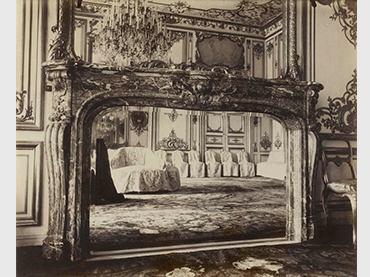
-
Wednesday, 4 December 2019 – From 11am to 2pm
Table 2. Uses of Photography
Photographic Archives and Political Violence. Appropriations and Resignifications
Photography is at once emancipatory and disciplinary. Halfway through the 19th century it surfaced with democratic promise, simultaneously contributing, since its inception, to apparatuses of social control and the auto-reproductive logic of state power. Photographic archives were part of the disciplinary apparatus, at least since the industrialisation of photographic technology in the final decades of the 19th century. The police archive of Alphonse Bertillon, implemented in the 1880s, is a paradigmatic example. Setting out from that genealogy whilst also questioning it, this table introduces different experiences of the resignification of archive photographs linked to dictatorships and wars. Such resignfications, including that distinctive form of archive, the family album, are proof of the traumatic experiences that offer models of resistance to archives’ repressive impulse, demonstrating that the social meaning of photographs and archives is not determined or limited by such disciplinary logic. Rather, it can subvert insofar as such meaning is produced with the uses and the forms of dissemination of photographs.
Jordana Blejmar. The Surviving Image: Photography and Disappearance in Argentina
Susana de Sousa Dias. Imagens fortes, memórias fracas: o outro lado de uma imagem
Lee Douglas. The Forensic Archive: Photography, Evidence and Knowledge in Twenty-First-Century SpainConducted by: Jorge Moreno Andrés
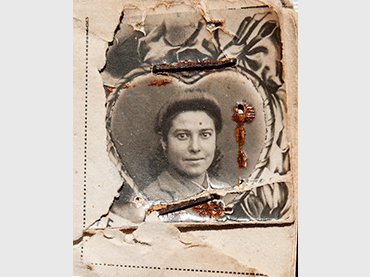
-
Wednesday, 4 December 2019 – From 6pm to 9pm
Table 3. Collective Photographic Practices
Power, Anti-Imperialism and Representation
Thinking about the relationship between photography and politics entails stopping at the intersections between representation and circulation to analyse their place in social struggles and transformations. Photography, analysed not solely from the possible uses of the image, but more specifically from its consideration as a social practice able to articulate collective organisation and build networks of resistance and solidarity, opens up a new space to question historical anti-imperialist processes in the 20th century. Therefore, on one side, there is a need to address the right to representation and the dissemination of images, traditionally linked to state and institutional powers. On the other, to address how the photographic practice carried out and circulated outside these colonial and restrictive logics inherently possesses a dimension of politics and resistance. This table situates photography at the centre of struggles of representation and political engagement, whilst understanding its dissemination as a crucial moment, in which far-flung struggles connect through images, but with a possible subversion of their meaning.
Rocío Trigoso. Why Are You Looking at Me? A Vision of Peru from the Experience of TAFOS
Ileana Selejan. The Insurrect Archive
Darren Newbury. From ‘Sweetness and Light’ to ‘Race and Revolution’ in US Photographic Diplomacy: Picturing the Civil Rights Movement for AfricaConducted by: Inés Plasencia
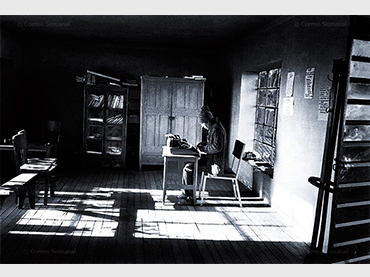
Towards a Political History of Photography
Social Movements and Photographic Practices
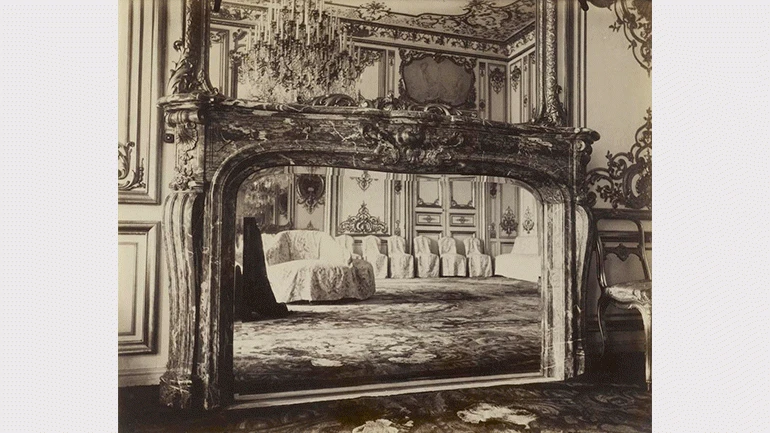
Held on 03 Dec 2019
The Museo Reina Sofía Study Centre inaugurates a study area on photography, coordinated by Jorge Ribalta, that aims to encourage photographic studies by following a social and cultural focus. This programme, developed through a broad array of activities — seminars, lectures, guided tours, encounters— also seeks to put in place a network between different focal points of research, with national and international scope, to work towards shaping a discursive public sphere on photography and its theories, practices and history.
The programme begins its journey from the context of Western modern art, characterised by the distinctiveness and regard for the specific nature of each artform. At the end of the 19th century, however, photography burst away into a hybrid form owing to the dozens of uses and social practices it triggered. Charles Baudelaire’s famous condemnation of photography in The Salon of 1859, ruling that its role must be as the “humble servant” to science and the arts, would form a long-lasting categorisation. The field of photography has thereafter been constituting different aesthetic, communicative and epistemic impulses and demands — as a hybrid, multifarious and lesser art, photography opened up a disruptive space, a space of otherness, within art’s modernity. A new history of photography should begin precisely from such alterity.
The international seminar Towards a Political History of Photography, which gets this new area off the ground, is organised into three round-tables of debate, each one pivoting around a case study, with a view to bringing together a range of research focal points and methods. The first table, Counter-Narratives, sets forth a re-examination of the figure of French photographer Eugène Atget based on an analysis of the ideological affiliations in his work, both implicit and explicit. The second, Uses of Photography, presents different experiences of resignifying archive photographs linked to dictatorships and wars. The third table, Collective Photographic Practices, places photography at the centre of the struggles for representation and political engagement, underscoring how the circulation of images enables faraway struggles to connect.
With the support of
The University of Liverpool
Force line
Avant-garde movements
Academic committee
Jordana Blejmar, Jorge Moreno Andrés, Inés Plasencia and Jorge Ribalta
Organised by
Museo Reina Sofía
Education programme developed with the sponsorship of

Participants
Jordana Blejmar is a lecturer in Visual Media and Cultural Studies at the University of Liverpool (UK). She is the author of Playful Memories: The Autofictional Turn in Post-Dictatorship Argentina (2016) and has co-edited a number of books, including Instantáneas de la memoria. Fotografía y dictadura en Argentina y América Latina (with Natalia Fortuny and Luís García, 2013).
Lee Douglas is a visual anthropologist, documentary film-maker, cultural manager and lecturer at Madrid’s New York University and at UCEAP. She is director of the cultural programme at the International Institute and is a producer on the digital re-publishing of the photobook Chile from Within with photographer Susan Meiselas.
Steve Edwards is a professor of History and Theory of Photography at Birkbeck College, University of London (UK). He is the author of The Making of English Photography (2006) and editor of the book series Historical Materialism.
Jorge Moreno Andrés is a social anthropologist and film-maker. He is author of the book El duelo revelado. La vida social de las fotografías familiares de las víctimas del franquismo (2019).
Molly Nesbit es profesora de arte en el Vassar College (EE. UU.). Autora de Atget’s Seven Albums (1994) y Their Common Sense (2000). En 2013 publicó The Pragmatism in the History of Art, el primer volumen de una serie que recopila sus ensayos y conferencias. El segundo volumen, Midnight: The Tempest Essays, apareció en 2017.
Darren Newbury es profesor de historia de la fotografía en la Universidad de Brighton (Reino Unido). Autor de Defiant Images. Photography and Apartheid South Africa (2009) y People Apart: 1950s Cape Town Revisited (2013). Coeditor de The African Photographic Archive: Research and Curatorial Strategies (2015) y del número especial de Visual Studies, “Photography and African Futures” (2018).
Inés Plasencia is a researcher, independent cultural manager and teacher. She is a lecturer in the Department of History and Art Theory at the Autonomous University of Madrid (UAM) and a professor at Madrid’s Duke University. She has worked with cultural institutions that include the Museo Reina Sofía, Institut Valencià d'Art Moderne (IVAM) and Tabakalera-Donostia Centre for Contemporary Culture, among others.
Jorge Ribalta is an artist and independent curator. His projects as a curator most notably include the exhibitions A Hard, Merciless Light. The Worker Photography Movement, 1926–1939 and Not Yet. On the Reinvention of Documentary and the Critique of Modernism, both in the Museo Reina Sofía (2011 in 2015, respectively).
Ileana Selejan is an art historian, researcher and a lecturer in the Department of Anthropology at University College London. She is currently working on the project ‘Citizens of Photography: The Camera and the Political Imagination’, funded by the European Research Council.
Susana de Sousa Dias is a film-maker and lecturer at the University of Lisbon. She was previously director of Doclisboa and is the author of works such as 48 (2009) and Luz Obscura (2016).
Rocío Trigoso is a researcher and visual anthropologist. She lectures at the Pontifical Catholic University of Peru, Lima, and is co-editor of La Calle es el Cielo. La Lima de Daniel Pajuelo (2014).
Más actividades

Difficulty. Forms and Political Effects of Deviation in Writing and Contemporary Art
23 February – 14 December 2026 – Check programme
Difficulty. Forms and Political Effects of Deviation in Writing and Contemporary Art is a study group aligned towards thinking about how certain contemporary artistic and cultural practices resist the referentiality that dominates the logics of production and the consumption of present-day art. At the centre of this proposal are the concepts of difficulty and deviation, under which it brings together any procedure capable of preventing artistic forms from being absorbed by a meaning that appears previous to and independent from its expression. By ensuring the perceptibility of their languages, difficulty invites us to think of meaning as the effect of a signifying tension; that is, as a productive and creative activity which, from the materiality of art objects, frees aesthetic experience from the representational mandate and those who participate in it from the passiveness associated with tasks of mimesis and decoding.
The economy of the referential norm translates the social logic of capitalism, where insidious forms of capturing subjectivity and meaning operate. In the early 1980s, and adopting a Marxist framework, poet Ron Silliman highlighted how this logic entailed separating language from any mark, gesture, script, form or syntax that might link it to the conditions of its production, rendering it fetichised (as if without a subject) and alienating its users in a use for which they are not responsible. This double dispossession encodes the political strategy of referential objectivity: with no subject and no trace of its own consistency, language is merely an object, that reality in which it disappears.
The political uses of referentiality, more sophisticated today than ever before, sustain the neoliberal-extractivist phase of capitalism that crosses through present-day societies politically, economically and aesthetically. Against them, fugitive artistic practices emerge which, drawing from Black and Queer studies and other subaltern critical positions, reject the objective limits of what exists, invent forms to name what lies outside what has already been named, and return to subjects the capacity to participate in processes of emission and interpretation.
Read from the standpoint of artistic work, the objective capture of referentiality may be called transparency. Viewed from a social contract that reproduces inequality in fixed identity positions, transparent in this objectivity are, precisely, the discourses that maintain the status quo of domination. Opposite the inferno of these discourses, this group aims to collectively explore, through deviant or fugitive works, the paradise of language that Monique Wittig encountered in the estranged practices of literature. For the political potency of difficulty — that is, its contribution to the utopia of a free language among equals — depends on making visible, first, its own deviations; from there, the norm that those deviations transgress; and finally, the narrowness of a norm which in no way exhausts the possibilities ofsaying, signifying, referring and producing a world.
From this denouncement of referential alienation, fetishisation and capture, Difficulty. Forms and Political Effects of Deviation in Writing and Contemporary Art turns its attention to the strategies of resistance deployed by contemporary artists and poets. Its interest is directed towards proposals as evidently difficult or evasive as those of Gertrude Stein, Lyn Hejinian, Theresa Hak Kyung Cha, Kameelah Janan Rasheed, Kathy Acker, María Salgado and Ricardo Carreira, and as seemingly simple as those of Fernanda Laguna, Felix Gonzalez Torres and Cecilia Vicuña, among other examples that can be added according to the desires and dynamics of the group.
The ten study group sessions, held between February and December, combine theoretical seminars, work with artworks from the Museo Reina Sofía’s Collections and exhibitions, reading workshops and public programs. All these formats serve as spaces of encounter to think commonly about certain problems of poetics — that is, certain political questions — of contemporary writing and art.
Difficulty. Forms and Political Effects of Deviation in Writing and Contemporary Art inaugurates the research line Goodbye, Representation, through which the Museo Reina Sofía’s Studies Directorship seeks to explore the emergence of contemporary artistic and cultural practices which move away from representation as a dominant aesthetic-political strategy and redirect their attention toward artistic languages that question the tendency to point, name and fix, advocating instead for fugitive aesthetics. Over its three-year duration, this research line materializes in study groups, seminars, screenings and other forms of public programming.

CLINIC 2628. A Community of Writing and Research in the Arts
February – October 2026
Clinic 2628 is a project which supports and brings together writings which stem from the intention to offer a space and sustainable time for research work in art and culture. Framed within an academic context which is increasingly less receptive to the forms in which thinking happens and is expressed, the aim is to rescue the academic from its neoliberal trappings and thus recover the alliance between precision and intuition, work and desire. A further goal is to return writing to a commons which makes this possible through the monitoring of processes and the collectivisation of ideas, stances, references and strategies.
The endeavour, rooted in a collaboration between the Museo Reina Sofía’s Studies Directorship and the Artea research group, via the i+D Experimenta project, is shaped by three annual editions conceived as spaces of experimentation, discussion and a demonstration of writings critical of what is put forward by today’s academia.
What forces, forms and processes are at play when writing about art and aesthetics? In academia, in museums and in other cultural institutions, the practice of writing is traversed by productivist logics which jeopardise rhythms of research and experimentation. The imposition of both scientism inherent in the structure of “the paper” and the quantifying of results which demand a criterion of quality and visibility sterilise and smoothen, from the outset, the coarseness that is particular to writing understood from the concrete part of language: phonic, graphic, syntactic and grammatical resistance connecting the language user to the community the language unites and activates. They also sterilise the roughness enmeshed in the same desire to write, the intuitive, clear and confusing pathways that once again connect the writer to those reading and writing, participating in a common good that is at once discovered and produced.
The progressive commercialisation of knowledge propelled by cognitive capitalism moves further away from the research and production of knowledge in artworks and artistic languages and practices. The work of curators and archive, criticism, performances and essays formerly saw a horizon of formal and emotional possibilities, of imagination that was much broader when not developed in circumstances of competition, indexing and impact. Today, would it be possible to regain, critically not nostalgically, these ways; namely, recovering by forms, and by written forms, the proximity between art thinking and its objects? How to write in another way, to another rhythm, with no more demands than those with which an artwork moves towards different ways of seeing, reading and being in the world?

Cultural Work
Thursday, 12 February 2026 – 5:30pm
This series is organised by equipoMotor, a group of teenagers, young people and older people who have participated in the Museo Reina Sofía’s previous community education projects, and is structured around four themed blocks that pivot on the monstrous.
Session number two looks to approach film as a place from which cultural work is made visible and processes of production engage in dialogue with artistic creation. From this premise, the session focuses on exploring how audiovisual content is produced, assembled and distributed, from the hands that handle the images to the bodies that participate in its circulation. The aim is to reflect on the invisible effort, precarity and forms of collaboration that uphold cultural life, that transform the filmic experience into an act that recognises and cares for common work.
![Basel Abbas y Ruanne Abou-Rahme, At Those Terrifying Frontiers Where the Existence and Disappearance of People Fade Into Each Other [En esas fronteras aterradoras donde la existencia y la desaparición de personas se disuelven entre sí], 2019](https://recursos.museoreinasofia.es/styles/small_landscape/public/Colecci%C3%B3n/abbasabourahme.png.webp)
Gaza and Aestheticide
Tuesday February 10, 2026 – 16:00 h
This seminar examines the systematic destruction of Palestinian collective sensibility — what we might call “aestheticide” — that has accompanied Israel’s genocide and ecocide in Gaza, and considers the conditions of artistic practice in its aftermath. Over more than two years, the demolition of universities, archives, museums, and libraries has not only erased cultural and intellectual infrastructure but has also targeted the very possibility of representation itself. The destruction of a people has been accompanied by the destruction of their image, their history, and their capacity to be known: reportage, scholarship, and cultural memory have been deliberately undermined, with media institutions, universities, and museums often complicit in this repression. Gaza consequently functions as a rehearsal space for a possible global future — of fascism, post-liberal authoritarianism, militarized borders, and AI-enabled warfare —, a laboratory for an emerging world order. What, then, becomes of critical analysis and resistance under these conditions? And what becomes of aesthetics and politics?
This three-hour seminar engages in dialogue with a broader line of work on the climate emergency and decolonial perspectives developed within the Museum of the Commons project (2023–2026) of the L’Internationale network, of which the Museo Reina Sofía is a member; as well as with some of the questions that animate the study group Aesthetics of Peace and Desertion Tactics. Finally, it is also embedded in a wider strategy of support for and commitment to the artistic and discursive practices of Palestinian artists and cultural practitioners, most clearly reflected in the TEJA network.
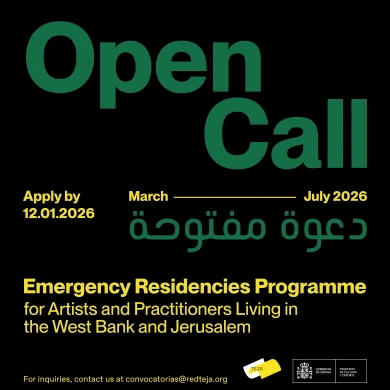
TEJA 2026. Open Call for Emergency Art Residencies
Proposal submission until 12 January, 2026
TEJA / Red de espacios culturales en apoyo a situaciones de emergencia [Network of Cultural Spaces in Support of Emergency Situations] has the mission to promote transnational cooperation by offering temporary art residencies to artists and cultural practitioners who find themselves in complex socio-political situations in their countries of origin. During their stay in Spain, residents receive accommodation, legal and psychological counseling, and access to a network of organizations and professionals with whom they can share, develop, and continue with their creative projects. The goal is to provide a safe and stimulating environment where artists can continue their work despite adverse circumstances and generate dialogue spaces that ensure freedom of expression through joint activities both in Spain and with international collaborators.
During 2026, TEJA hosts three new residencies, each lasting three months, dedicated to supporting artists and cultural practitioners residing in the West Bank and Jerusalem. In addition, in the second half of the year, TEJA hosts three additional residencies for Gazan artists, which are offered by invitation (as Spain is currently unable to facilitate evacuations from Gaza, these invitations are coordinated through France). These residencies aim to provide a stable, creative environment and foster artistic exchange in the face of ongoing adversities. Through this new program, TEJA reaffirms its commitment to amplifying Palestinian voices and empowering artists as they navigate these turbulent times.
The selection is carried out by the TEJA network in close collaboration with each hosting partner. This year the hosting partners are: La Escocesa (Barcelona), hablarenarte / Planta Alta (Madrid), Espositivo (Madrid), Institute for Postnatural Studies (Madrid), Casa Árabe (Córdoba). The selection prioritizes the artist’s personal and professional situation first, and then the alignment with the practices and themes of the hosting spaces. Proposal submission deadline is January 12th, 2026, 23:59 h.
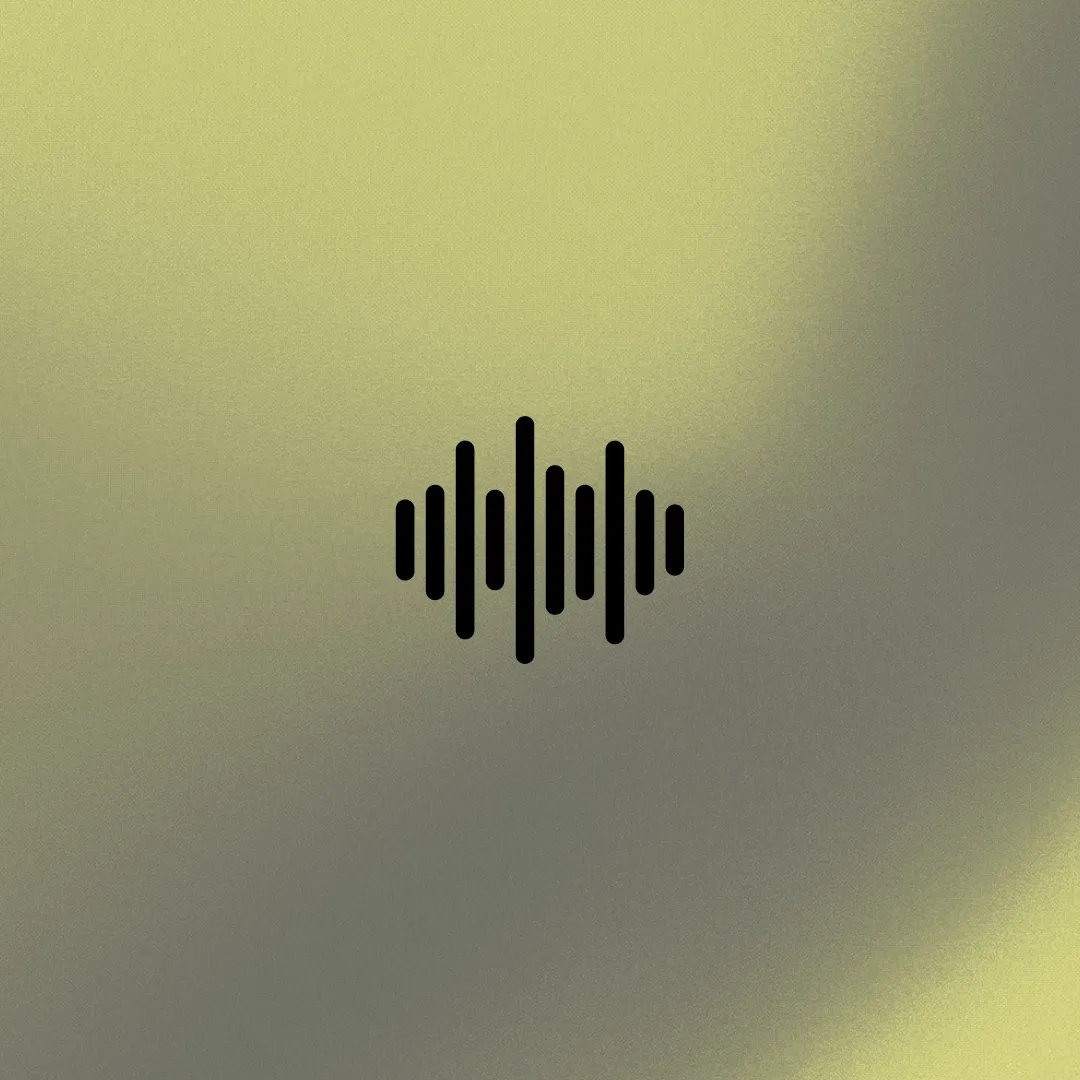
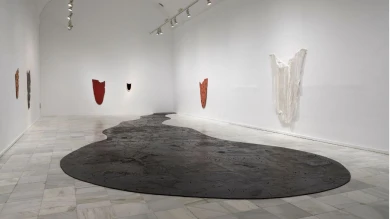
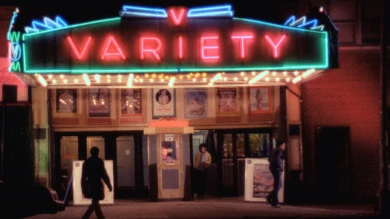
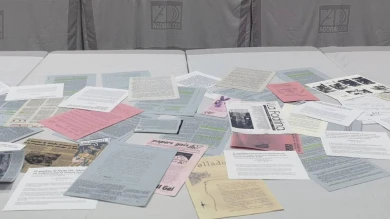
![Miguel Brieva, ilustración de la novela infantil Manuela y los Cakirukos (Reservoir Books, 2022) [izquierda] y Cibeles no conduzcas, 2023 [derecha]. Cortesía del artista](https://recursos.museoreinasofia.es/styles/small_landscape/public/Actividades/ecologias_del_deseo_utopico.jpg.webp)
![Ángel Alonso, Charbon [Carbón], 1964. Museo Reina Sofía](https://recursos.museoreinasofia.es/styles/small_landscape/public/Actividades/perspectivas_ecoambientales.jpg.webp)